Foreword
Dear English speaking reader, this is an automatic translation of the original French text.
If you wish to help to make a real text in English, your help is welcome. Do not hesitate to contact me at the address .
Thank you, have good reading.
Regimental Number 8894T52
I was seventeen, I did not want to continue my studies, I dreamed of a life more hectic. Like the majority of young people of my time, I only knew the sea and distant countries through picture books and some black and white films. There was a book that particularly marked me and the film was Icelandic Fisherman . Perhaps we should also see a little atavism, because my father told me that my grandfather had participated in the conquest of Tonkin in the 1880s, in the naval artillery as saddler. Also as soon as I read in the newspaper that the navy was looking for hired, especially for specialty radios, without saying anything to my parents I wrote. Having received a favorable response, I informed them. They did not do a lot of trouble. A comrade, Fernand Richardson, of whom I speak in The War as seen by a child, decided to follow me.
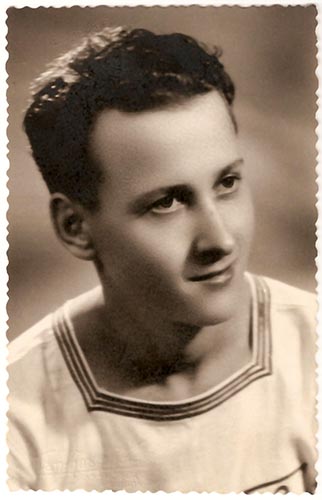
We thus committed ourselves to Thiry barracks of Nancy, destination the maritime training center (CFM) of Hourtin in Gironde on November 20th, 1952.
A funny memory: between Bordeaux and Lacanau we took a small gas-powered railcar. At each stop the mechanic climbed on the roof to refuel in charcoal, the railcar went so fast that a merchant was passing from one car to another on the steps to sell cakes through the windows.
As soon as we arrived at the incorporation at Hourtin, the guys who were there at the entrance were making fun of us by shouting "Ah! beautiful hair ", indeed we were directed to what we could call hairdressers, they were guys who had never done that in their lives and who feasted to put the ball to zero. And there the prison started.
We were brought to clothing and pif we touched our uniform outfits, often too wide (they were afraid of fattening) and then at the sails we hit our hammocks, without showing us how we had to settle the spiders, so that the first night not bad ended up on the ground. In the morning it made us all funny to be awake to the sound of the bugle.
After all sorts of medical visits and a first bite, we were incorporated, that is to say that we touched the national marine leggings tape to put on our cap and we changed the building.
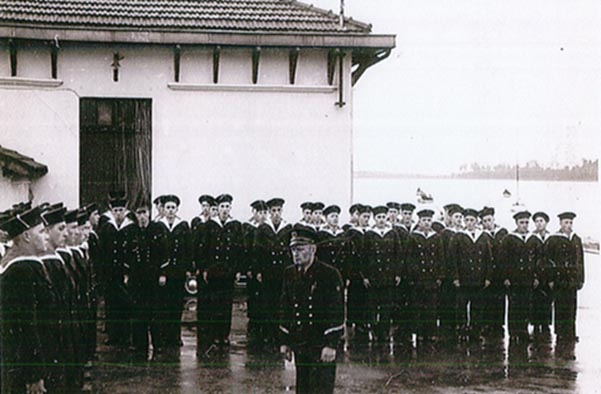
At that time it started to get very cold, ice formed on the lake, we had to break it to get the boats out for sailing or rowing, we did not have the right to the gloves and we suffered a lot from our frozen hands, as well as the handling of weapons. One day with some comrades we were in the hammock washing chore in the lake, we were so cold hands that some were crying. In our building the pipes had frozen, for the toilets we had to go out.
At the second sting, the whole company was sick, the vaccine was certainly of poor quality. Those who had the highest temperature were sent to the infirmary, the others had to fend for themselves, go out in the cold and be constantly reminded to order because to move in the camp you had to be in a group and walk to not.
Two months spent doing sakotage (handling weapons), boscotage (knots and navigation), chores, guards, various tests to be directed to different specialty schools and it is with joy that Fernand and I were admitted at the radio school of Bormettes. First group 1953.

School of Bormettes
What a change! Already down the train to Hyères, this avenue in front of the station lined with palm trees, we had the impression to have changed continent. The school of Bormettes, near La Londe-les-Maures was made up of wooden barracks in which we went to study and live, without walls, that mimosas for limit - I kept the nostalgia of their perfume -, and the view of the big blue with the islands of Hyères on the horizon. Palm trees, cactus, exoticism what, the camp was dominated by a castle: the castle of Vernet and its extension, the Astrolabe, where we went every morning for the raising of the colors as well as to take our meals there. There was also the prison where (there is now prescription) I kept Alain Delon who had mown radio equipment for one of his friends radio amateurs. I knew only a few years later, during a military period at school, that he had just shot his first film.

The weather was beautiful, we did not have far to go to the beach, from the month of May we started to bathe, the discipline was flexible enough, our main activity was to learn our job: morse, radio theory. Only downside, the evening we were eaten by mosquitoes, the saline of Hyères being close.
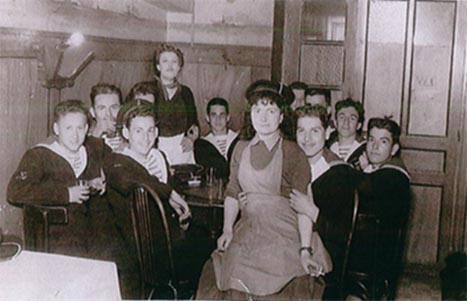
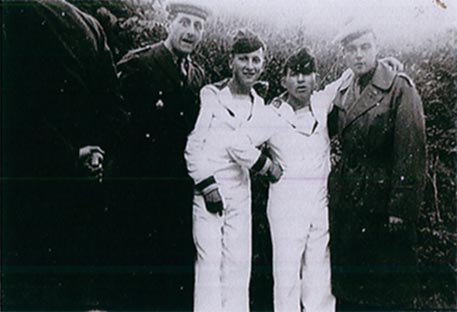
An intermission during our classes: a detachment of volunteers went to Lourdes to participate in the military pilgrimage. Thousands of soldiers of all arms, in their traditional uniforms, are present, it is on this occasion that we touched the white tunics. People thought we were Americans. We slept in the marabout tents mounted by the paratroopers, at this altitude we did not get hot
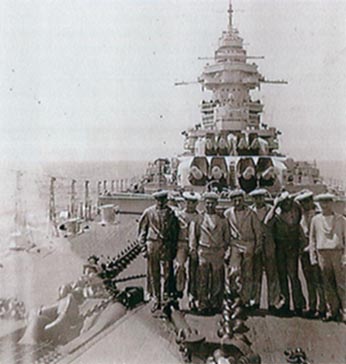
Six months passed in this terrestrial paradise and to close our formation, we made a cruise of a few days on the Richelieu. Happiness, this is the first time we sail, finally! But what a surprise, the immensity of this building, we spent our time asking our way, whether to find the radio PC or the galley.
And this is the final exam, we are gathered in a room, embarkations are registered on the board and each in turn, following his classification, chooses his.
I chose at random the cruiser Montcalm especially to be with my comrade Fernand, I must say that I have never regretted it, it was magnificent and in addition it was the boat which at the time was traveling the most, if we except Jeanne, who regularly went around the world with the student officers.

Promotion Herminier - July 30, 1953
We were then allowed nine days of leave in Verdun, but following or thanks to strikes, we had twenty-two. It was a beautiful weather, the morning we were going to be pointed at the barracks in Thierville, we were doing the wall, so we spent our days at the beach on the banks of the Meuse. At the end of this time we were loaded into trucks, already for Metz at base 901, there were so many soldiers that in our case we had to spend the night outside in the grass. The next day the trucks took us to Dijon where we were embarked on the first train more than crowded, the train drove all night stopping all the time. We tried to sleep on our bags in the corridor and when we arrived at the arsenal of Toulon, we learned that Montcalm had gone to Greece for the earthquake. So we spent the night at the guard company and in the morning a sailor told us that Montcalm had just crossed the pass. We quickly made our hammock and rushed to join our board.
Montcalm Cruiser
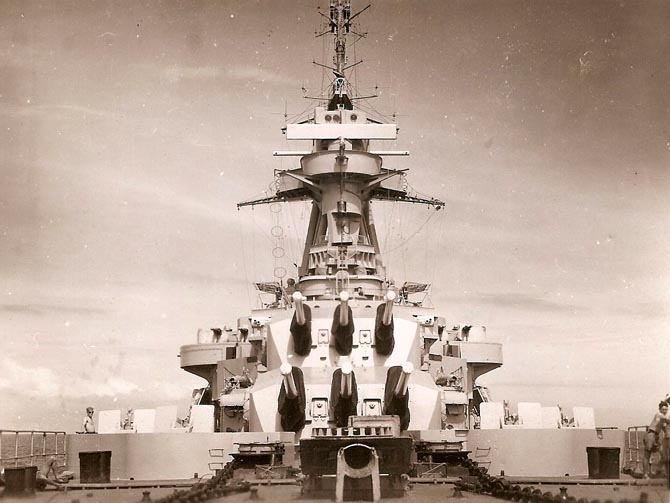
Finally our real life as a sailor will begin. That he is tall and that this boat is beautiful, I swear we were moved when we boarded.
For our boarding, nothing special: passage through the BSI (interior service bureau), reception by the weapons captain (the Bidel in familiar terms), towards our post (the post 6 starboard for transmissions, radios, transfilists , helmsmen). The post is the place of life of the sailors, it is the place where we sleep, where we eat (because there is no cafeteria) and where we spend a large part of our leisure , reading, playing cards and others. The chef de poste tells us our place and then as usual we went to get our hammocks at the sail (three years in this bed, we slept well, rocked by the roll when there was a lot of time) and our life on board begins. We will spend two years in this post where we were sixty, in the greatest promiscuity, and yet there was never a serious crisis, sometimes a little joke but that's it.
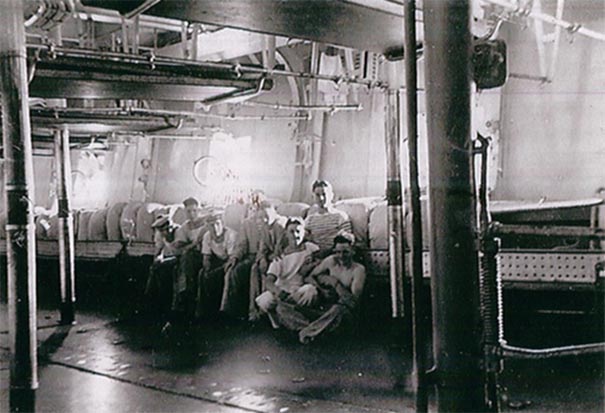
This life is regulated like music paper: seven hours of motion, a quarter of an hour later, to the bugle: the march, the hammocks must be folded and stored in the rail, tables and benches that we had set Ceiling went down for breakfast, toilet and at eight o'clock call then wash station. My job was to polish copper letters with value and discipline plates using "Naol". Then the maintenance station, each went to professional occupations. In addition to day or night, we had to watch the receiver on watch.
For meals, each in turn, we went to the galley to get the bread, cheese and wine (coffee in the morning was served in the kitchen) and the other went to the kitchen with the double-bowl lunch box and a plate in which we put the entrance and sometimes with another for a dessert, a real juggling especially when there was bad weather.
We were classified by thirds: a third party chore, a third service and a third party out, we could go to the ground on the days when we were part of the third of output or chore. It must be said that radios, as they were to ensure quarters, did not care or chore, which aroused many envy.
To go ashore, at the call of the permissionaries, we had to pass the magazine and if all was not impeccable, especially hair too long: turn around.

Nexer, Le Flem, Gros, s / m Denis, Congar me, Gourlaouen, Hugues, Bombardier, Rizetto
As every time the Montcalm returned from the sea: general painting, the whole crew to play either the brush or the hammer to sting the rust and theoretically I did not suffer from vertigo, with two comrades I was designated to paint the top of the rear mast in black, work devoted to radios because we had our antennas. The rest of the mast was painted gray by the detectors. At more than thirty meters high, without harness, just one end (rope) around the belt, paint the yards it was almost acrobatic high flying.
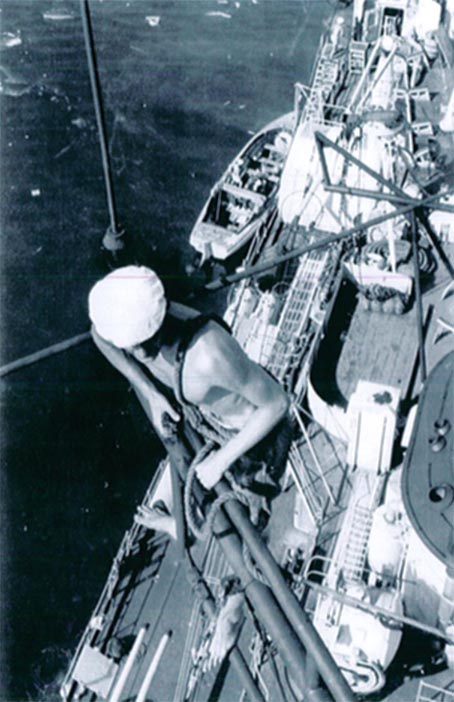
I was eager to sail, finally it happened, we did the saline campaign, ie we circled around the islands of Hyères, the weather was wonderful. then we went a little further, to Malta then to Algiers, to Oran, to Mers El Kebir of sad memory. The superstructure of the ships sunk by the English was still emerging from the water.
On November 20, 1953, we were doing anti-aircraft exercises, naval airplanes attacking us by flying along the waves, they were flying so low that the wind created by their propellers was digging the surface of the water. I was taking pictures from the crown of the watch, I had just taken one. As I pushed my film, one of them (a SB2C) passed nearby making a huge noise and suddenly a boom and a great silence. I look up, I see flying pieces, the engine passes over the ship, flames rise on the edge immediately extinguished by a wave. Instead of pitching to climb, the pilot wanted to turn but his wing touched the water and the plane crashed on our rear starboard, slightly injuring some gunners 40 beaufort. There were two airmen on board, boats were put in the water to collect the debris floating on the surface, and the crew went to the band station to pay the honors while the bell rang to the dead. It was shortly before noon, we did not eat a good heart.
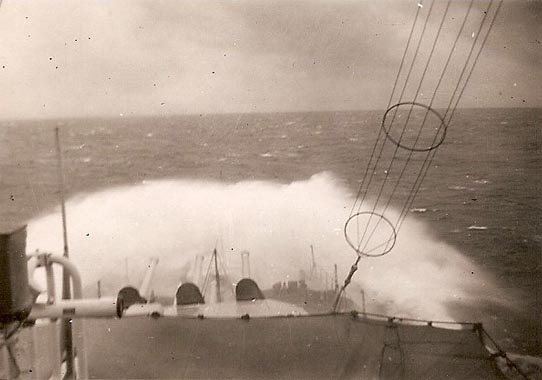
Franco was telling stories about Morocco, and France to show his big arms decided to send the cruiser Gloire (sister ship of our Montcalm) and from January 18 to February 3, 1954, as they lacked a radio I went in reinforcement. We turned around the Balearic Islands, passing between Menorca and Mallorca, then we went to North Africa: Arzew, Oran, Mers El Kebir and on our return we were caught in a strong storm, winds of force 10.
Indochina
The war in Indochina was raging, Dien Bien Phu was besieged and very close to falling. We were in the Mediterranean for the spring cruise that was to take us to Brest, but off Gibraltar we received orders to return to Toulon in anticipation of our departure for Indo with Gloire. We had 72 hours of leave, just back and forth to Belleville to kiss our parents. They were very saddened that day. The Far Eastern news that came to us was terrible and see their children go so far …
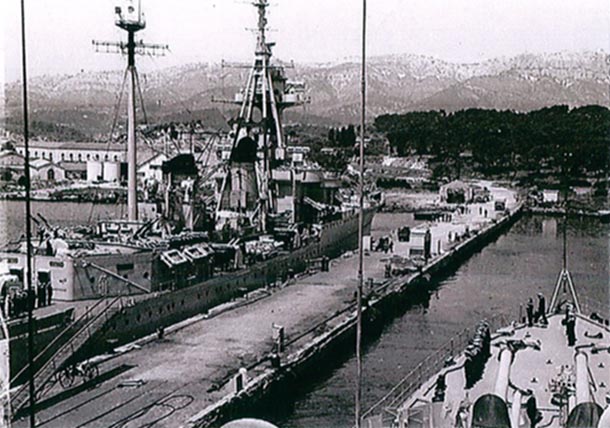
We leave the dock, Gloire will do the same
On the way to the Indochina countryside, on the 29th, we pass Stromboli and at night the Straits of Messina, a very beautiful sight with the two illuminated cities: on one side Messina, on the other side Reggio Calabria. On the 30th we were in Port Said, we had to wait for the formation of a convoy to engage in the Suez Canal, because the buildings can sail only in one file, a convoy flowing in the other direction at the departure Suez and the two convoys intersect in the middle in the Great Lakes region. It's fun to see the boats sailing in the other channel, it feels as if they are moving in the sand, because we are in the desert. In the evening we were in Ismailia, a town in the middle of the canal where the canal technicians were mainly staying. At the time it was mostly French, but after the war of Nasser, the place was taken by the Russians, an oasis in the desert all lit up, a beautiful memory.
The next day we were in the Red Sea, in reality it is covered with an orange film formed by plankton and first surprise: flying fish (exocets). These poor animals are not very lucky, because when they are hunted, they jump out of the water and hover, they have fins like swallow's wings, and it is at this moment that the birds of sea take the opportunity to catch them.
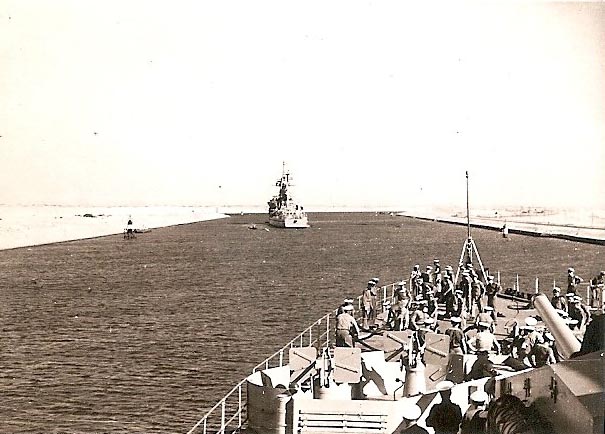
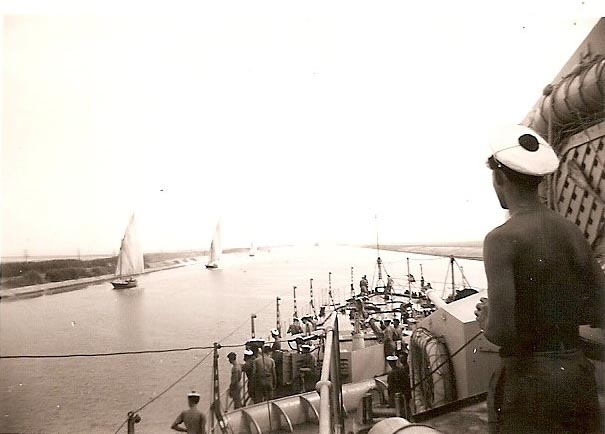
By loudspeaker we were invited to put on the colonial outfits and we tidied up for a while our cloth blue and warm blue. We arrived in the hottest area of the world, we were approaching the tropics. The heat in the posts became unbearable, and as at the time the boats were not equipped with air conditioning, just a few fans who were brewing hot air, each of us sought a place to hang his hammock in the air. superstructures, then at Singapore stopover we bought mats and slept on the deck.
In the machine the situation was worse, there were more than sixty degrees, so the showers and cold drinks were reserved for the mechanics. The rationing of the water was very felt, in the morning to wash we were queuing in front of the sinks. Since there was only a quarter of an hour of distribution, the first arrived filled the washbasin, washed by twisting his washcloth on the ground to not dirty the water, the following take turns taking the Instead, in general we were five to wash in the same sink.
It seems that during the war, water bunkers had been replaced by oil bunkers, and as the sea water distillers were no longer working, we were there. We could take showers with sea water, but since it was not possible to rinse, we were salt tights and we had the skin all irritated, we caught the bludgeon and as medicine there was only iodized alcohol.
On June 5th we stopped at Djibouti, then we entered the Indian Ocean and there we had a big storm.
June 15-16-18 we stopover in Singapore, first contact with Asia, nothing to report except that it is a free port and the city is populated with shops where you can find at low prices all competition objects from around the world. We had touched a few dollars Malay, it did not allow us to do crazy.
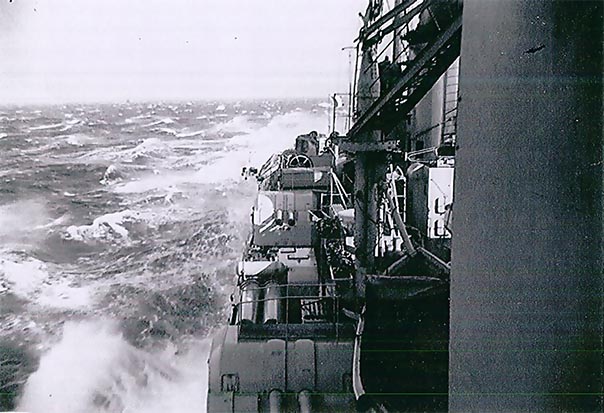
The crossing of the Line
Half a century ago, to travel far, very few people took the plane and in general the trips were made by boat. To break the monotony a little, it was traditional, when passing the equator, to celebrate the baptism of the line.
Friday, June 18th we left Singapore and we were approaching the equator, we had vaguely heard about it but it was clear, we were not going to escape baptism. On the evening of the 17th, the country guard with the postman (by bike please) goes to the posts. The petitioners (those who have never crossed the line, we were many to be part of it) must withdraw from the postman their summons to the ceremony. It's quite difficult because they have their hands tied and this document is stuck in the fat-coated back of the postman who is shirtless.
On the day of the party the crew is awakened by a thundering « Tremblez néophytes » howled in the speakers. There were three kinds of members: we the neophytes, the knights who had crossed the line once, and the dignitaries who had done it several times. It is they who will initiate us.
Early afternoon we gathered in swimsuit on the beach before, the carpenters had built a kind of pool using planks and tarpaulin.
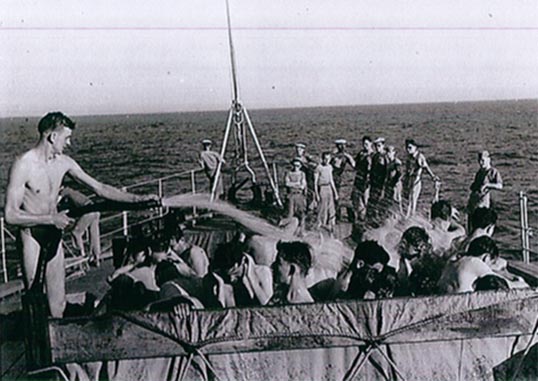
A mermaid, Neptune and Amphitrite rappelling on the telemeter bridge at the top of the mast before, Neptune wearing red with a crown on his head and Amphitrite with doubtful femininity, it would have been difficult to find a young woman, at the time there was no woman on board. The Pasha receives them with honors, Neptune sits on a throne and pronounces his speech:
On this Friday, the day of the year of grace, 1954, me Neptune, who arouses the storms and commands the waves, I welcome you. O proud browsers. Having seen you in the flaming wav of the majestic Phoebus, Mercury, a quick messenger, announces to me the audacious intrusion of your nave on the borders of my kingdom. And the faithful Isis announces to me that you are the crew of Montcalm and that you come from France. Be my guests for a day.
But what do I see! What is this infamous herd of cattle? Are you neophytes you offer me? O vile multitude fear my divine gaze.
You are going to undergo a purifying baptism which will allow you to pass from the state of non-being to that of knights of wet, colored, floured. Proud savages of the Oula-Oula-Sa-Fait-Bobo, you must all be born, I will perhaps recognize mine. Bakers, apply the white spray.
My divine protection accompanies you until the end of the journey. Good sea and good wind. And now that the party begins because that is my pleasure.
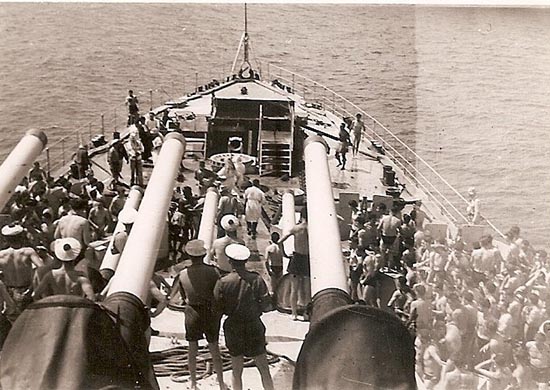
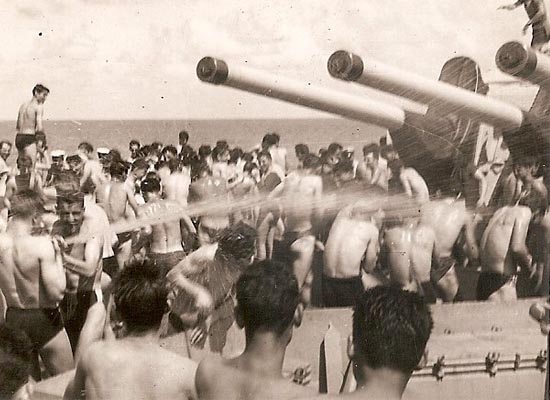
Neptune then rose from his throne and headed for the pool, accompanied by two altar boys who presented him the list of neophytes. At the call of his name everyone settled on a seat (ejectable), the barber smeared his face with what was supposed to be shaving cream with a large brush, then with a large sword chipped he was trying to shave it. At this moment his helpers rocked the neophyte into the pool, where savages, daubed with black, plunged his head several times underwater. Half asphyxiated, he was then thrown out, there the baker sprayed him with flour and the cooks bombarded him with beans, then he was copiously sprinkled with fire hose under heavy pressure. The initiation was over and we had become knights of the sea.
The arrival in Indochina
On the evening of June 19, we arrived at Cap Saint-Jacques, where the Saigon River flows out, which we will go back the next day. I was moved to see this country, the scene of so much suffering and that we were supposed to defend.
We go up the river, Gloire in front (she had the admiral cruiser aboard) and behind us, everyone at the battle station, those who were outside had to wear a helmet, the staff feared firing which we would be the target, a plane accompanied us. We laughed at the boats we crossed, especially LSD Foudre. Their sailors were torso and bareheaded, they laughed at our fear. Even at Saigon, the first time, the sentinels were ordered to shoot at night all that floated on the river, and God knows if it passed. All night we heard gunshots.
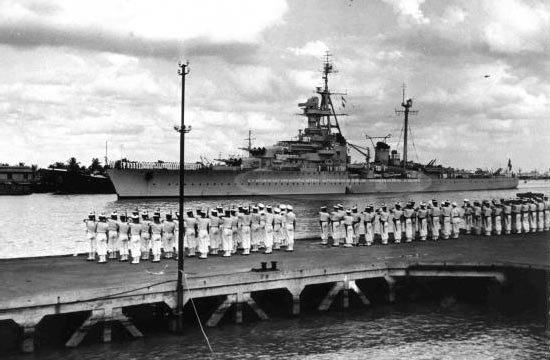
Upon our arrival in Saigon, the authorities and a detachment of sailors on the Argonne wharf pays us the honors, on board all the crew available in outfit must stand at attention at the band station. The population welcomes us with joy, because it still imagines that our arrival will change the course of the war.
Saigon is a typically colonial city, with its residential part and its native districts. A teeming city with its rickshaw, its merchants on the sidewalk, its women chewing betel and spitting red. Some interesting parts: the botanical garden, the covered market, the BMC (controlled military brothel) where there were lots of young women, his name the Gallieni , but we especially liked to go to the huts at night to eat the Chinese soup, we have not been slow to adapt.
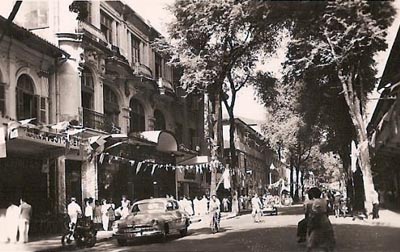
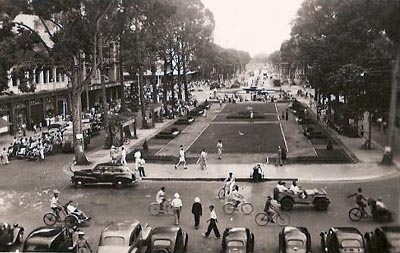
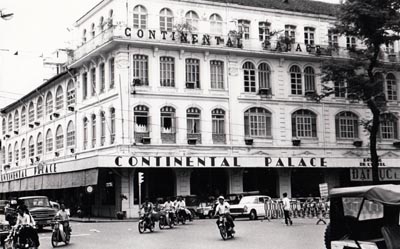
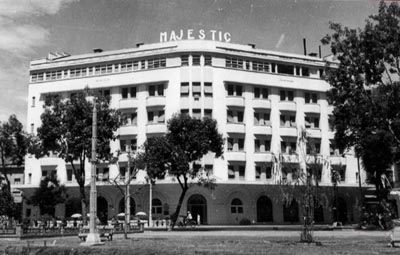
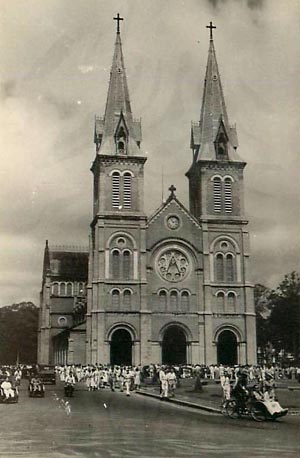
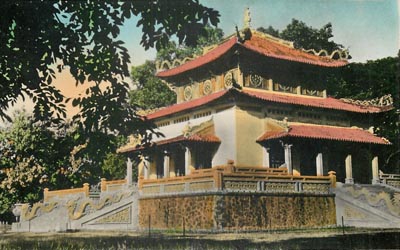
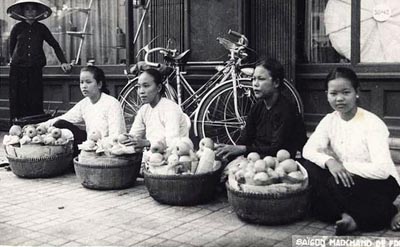
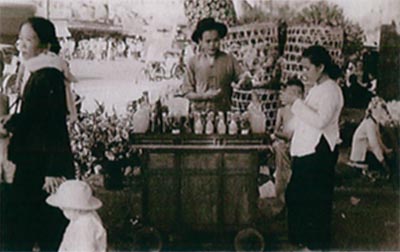
Very quickly we resumed the sea to perform reconnaissance missions along the coast, sometimes we fired at 152 at the request of troops on the ground.
Log book. June 20 to July 4 Saigon - Nhatrang from July 6 to July 9 - Thui Hoa July 9 - Phu Hoi July 10 - Culao Re July 11 - Tourane from July 12 to July 16 - Culao Cham July 17 - Fo July 18 - Culao Cham July 19 - Tourane July 19-20 / 7 - Norway Islands July 21-22 / 7 - Halong Bay from July 22 to July 28.
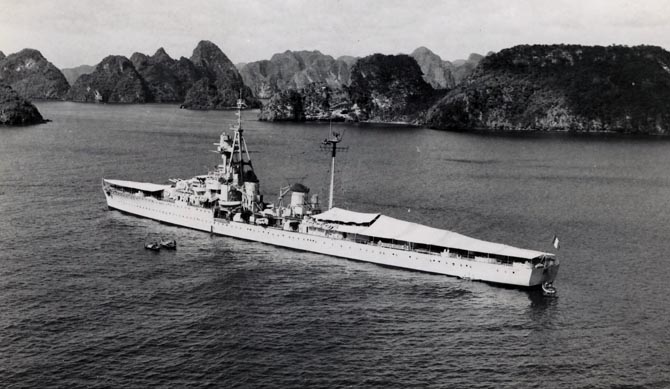
From the 22nd to the 28th we went to Long Bay. What a marvel, these thousands of rocks between which the boat had to sail! It's impossible to describe and hundreds of photos would not arrive there. These rocks emerge from the water, their base is undermined by the sea, so that for some one wonders how they still stand and the sea is so clear. To navigate between them you need maps because it would be possible to get lost. Many typical rocks have a name, like le chandelier that was on the ten dollar bill. At the time no one knew the bay of Along, except obviously those who had gone there. Now with tourism and movies, it's not the same anymore.
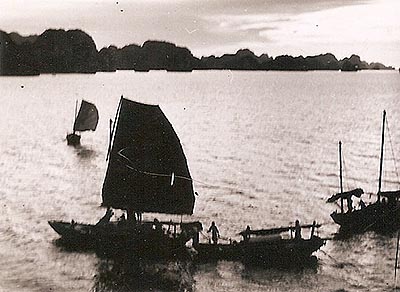
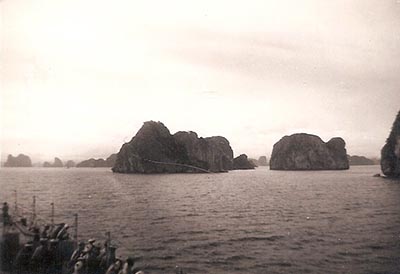
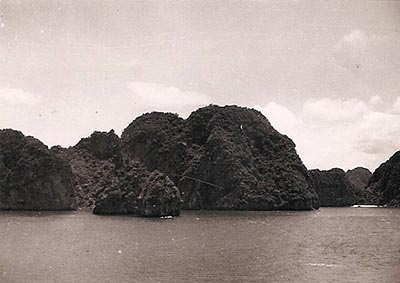
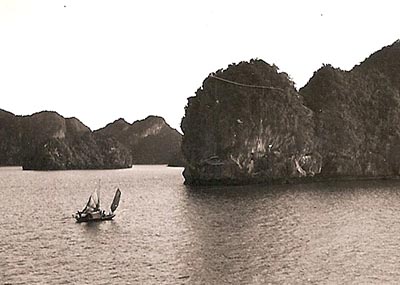
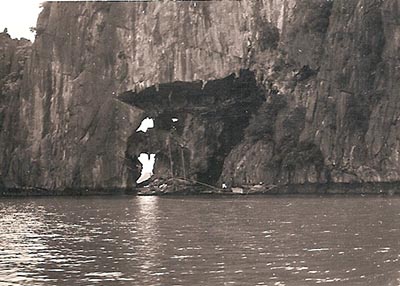
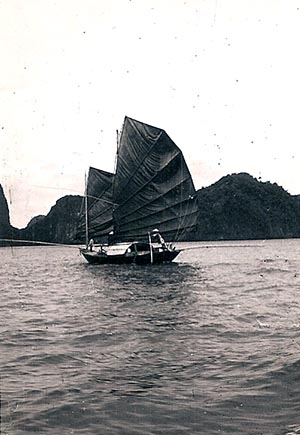
A funny Anecdote …
July 14, 1954 we were wet at Tourane, certainly to say that we were still there in force. The staff had organized a major military review. A detachment of Montcalm was to participate. Two radio stations, Gros and I, have been nominated to be part of it. The call was at 8 o'clock, but as I had been from midnight to midnight, I usually had the opportunity to stay up to eight hours.
As I was not on the call, I was called by the speaker, I then pointed in shorts to tell them, hoping they would leave without me. No luck I was ordered to swarm, which I did without haste. When we arrived in Tourane, thousands of soldiers of all arms in traditional uniform were lined up on either side of a large avenue. We stayed there for almost two hours in full sun, waiting for the review to begin. Some were wrong. Finally she begins, rest, attention to you, arms on the right shoulder etc. For those of us who had not been handling weapons for quite some time, it was far from perfect, which had the gift of annoying the ship's officer and the sako (mariner officer in charge of police on board) who commanded us.
During the handing over of the decorations, while we were the weapon with the foot, in the greatest silence, we heard a noise tac, tac, tac. It was Gros who had just dropped his rifle on a rail that was unfortunately there. All the heads turned to us and we heard laughter, the guys said, « C'est le radio, c'est le radio » and Gros instead of choking made big gestures to make it clear that he had plenty of …
When we reached our edge, the officer ordered us to take the exit card together to punish us, but at that moment the commander came to see us, "bravo, you guys did well and you well deserved double ". The double was a reward in the navy, we were entitled to a quarter more wine or a dessert. The sako then asked what to do and the officer with a shrug "let it go" and that was the end of the July 14 review.
… and a less funny Episode
The Indochina war ends on July 21, 1954, the partition of Vietnam is consumed between the north and south, the separation is set on the 17th parallel not far from Tourane (Da Nang). A clause in the Geneva Accord : Passage To Freedom was to allow Vietnamese from the north who wanted to flee the communist regime to leave Tonkin freely for a period of three hundred days which was to end on May 18, 1955.
August 8, 1954 we were in Halong Bay, we saw approaching landing boats loaded with Tonkinese civilians approaching us. They boarded and were installed on the back beach and in station 10, normally reserved for music when we had Admiral Wing on board and in which the guys from the colonial who had been brought with us. The carpenters had installed latrines at the stern above the water. A thousand and twenty-one people at once makes a lot of people; we landed them the next day in Tourane, but a baby had taken the opportunity to be born. It was perhaps the first time that it happened on a warship, a quest was made to the crew, she brought back a good sum.
On the 10th we loaded a new contingent in Halong Bay, which we landed on the 13th at Cape Saint-Jacques, and again a birth! New quest, provided that it does not become a habit, then two other trips from 15 to 25: in all we evacuated 4,200 refugees. Several hundred thousand more were evacuated by boat because we were not alone, and by plane. The Americans took our follow-up under the UN. What happened to all those displaced people in a south that could not get enough? They were caught a few years later. In any case, in a few days, we traveled 15,200 nautical miles (more than 28,000 km), more than we did in a year in France.
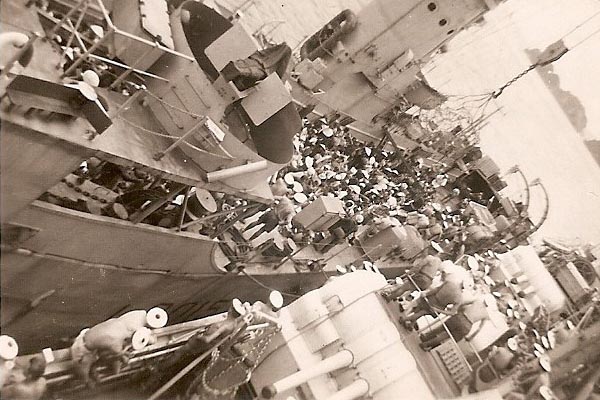
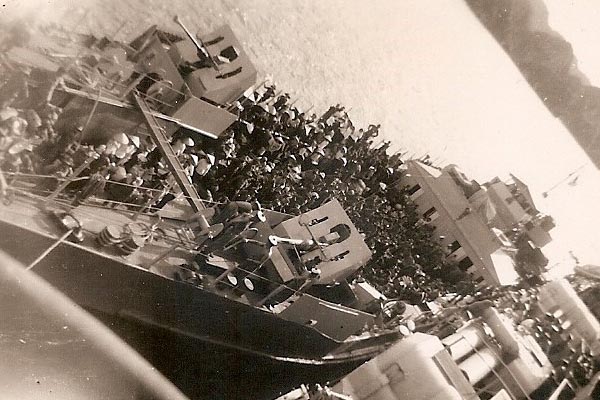
We stayed in Saigon from Aug. 25 to Sept. 15 and then again at sea: Cam Ranh 16 and Sept. 17 - Nhatrang from 18 to Sept. 20 - Vinh Ro Sept. 21 - Culao Ré Sept. 22 - Tourane from 24 to Sept. 28 - Culao Cham 29 and Sept. 30 - Port-Dayot Oct. 2 - Nha Trang from 2 to Oct. 5 - Port-Dayot from 5 to Oct. 7 - Poulo Condor (the former prison) 11 and Oct. 12 / 10 - Saigon from 13 to Oct. 17.
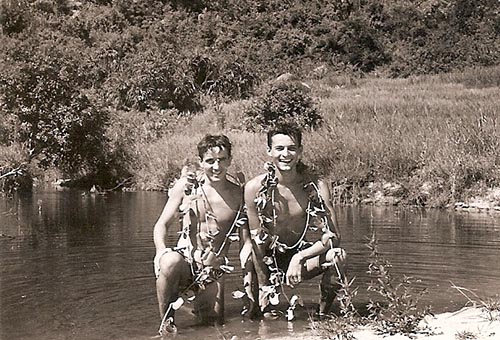
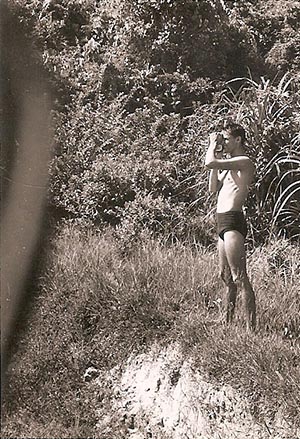
Christmas 1954, a Truly Memorable Evening!
To celebrate Christmas with dignity, in our post we decided to bring a bottle of alcohol each without telling the others what alcohol we had chosen. The pasha had decided to organize a decoration competition of the posts. It must be said that we had made an effort, because after the midnight mass that took place in the Tank Lightning, officers, the commander in mind, have toured the posts and we had obtained the 1st price.
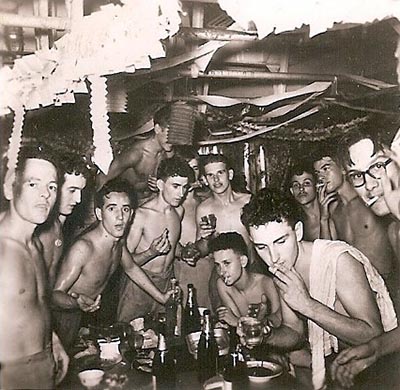
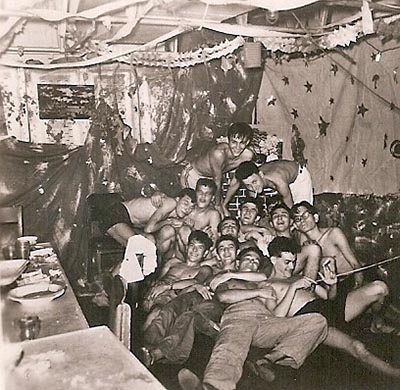
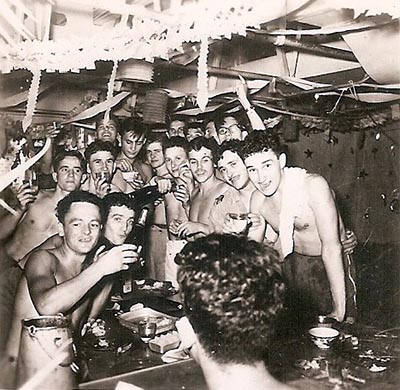
The New Year's Eve meal was rather frugal but it was well watered, I remember that Tino Rizzetto was standing on a bench and was singing « Quand allons-nous nous marier, nous marier… » with the Barthod accordion, when he steeped. We put a mat on the ground and we stretched it, the accordion did not survive. Then, one after the other, the guys collapsed and we laid them next to each other. Some of whom I was part went to sleep outside. But in the morning when we went down to the post, the guys had vomited, there was a terrible smell, most of them were still sleeping, we had to water them with the fire hose to wake them up. At noon there was brains to eat, we were unable to honor the meal.
Continuation of the logbook. Cap Saint-Jacques 18 and Oct. 19 - Saigon from Oct. 19 to Nov. 28 - Port-Dayot Nov. 30 - Saigon from 2 to Dec. 6 - Singapore on 8 and Dec. 9 (inter-allied exercises) - Saigon from Dec. 11 to Feb. 11, 1955 - Port-Dayot from 14 to Feb. 18 - Cam Ranh from 18 to Feb. 21.
Year 1955
At the beginning of the year Fernand and I finally got our stripes of Quartermaster, it was not too early, in the Navy the advancement was rather difficult, which was a lot of repelling to re-present, another opportunity to celebrate.
Tourane Feb. 22 — Iles Paracels Feb. 23 — Tourane Feb. 24 au Mar. 6 — Port-Dayot du 7 au Mar. 11 — Tourane du 20 au Apr. 28.
Hue
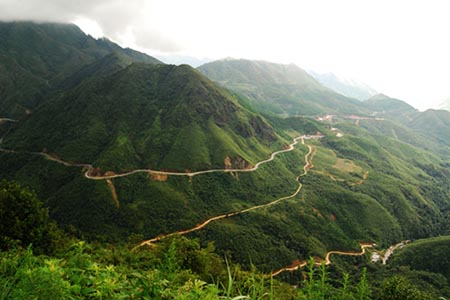
While we were at anchor in Tourane, we were offered an excursion to Hue, the ancient imperial city of the emperors of Annam, at the time it belonged to Emperor Bao Dai. We went aboard the GMC of the army through the Ocean Cloud Pass that connects Tourane to Hue, about one hundred kilometers of mountain roads. The cloud pass is twenty-five kilometers from Tourane, and as the name suggests, it is often in the clouds. This is where René Berringer, of whom I speak later, was assigned to the aviation radar station.
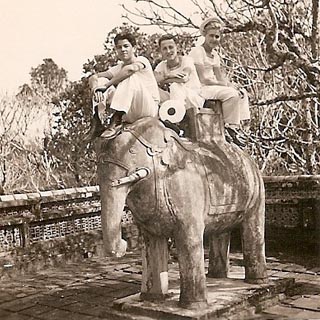
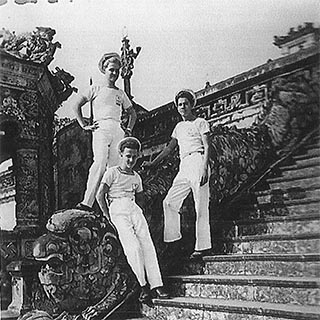
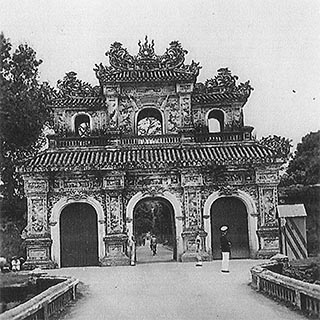
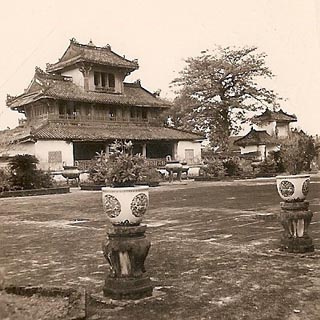
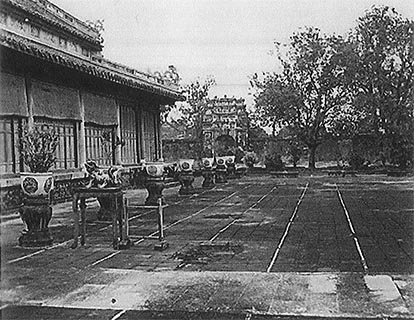
The end of our presence in Tonkin
On May 14, 1955 we were in Halong Bay, it was a parade of buildings leaving Tonkin. We had on board journalists from different news agencies. All day we had to ship their items to France by, I believe, the intermediary of Saint-Lys radio (FFL 3). It was a PTT radio station located in the Pyrenees and was responsible for connecting all the land with all the boats, anywhere on the sea, it was also called le berger de la mer. . This station was closed a few years ago, she deserved that the post publishes a stamp on this occasion. We left last. A page of our history that was turning. When I think that my grandfather had participated in the conquest of Tonkin …
A few days earlier we had a farewell ceremony at the Sailors' Cemetery. This cemetery was located at the foot of the rock of Cat Nang Island in Halong Bay, there was a small beach in the shape of a boat bow and all the sailors who died since the conquest of Tonkin were buried there, whose Admiral Francis Garnier before being transferred to Saigon and France. This cemetery does not exist anymore, in 1956 the government of North Vietnam raised all the tombs and most of them were repatriated to the military cemetery of La Legue near the necropolis of Fréjus. It is now a tourist place that has been renamed Ilot Tip-Top.
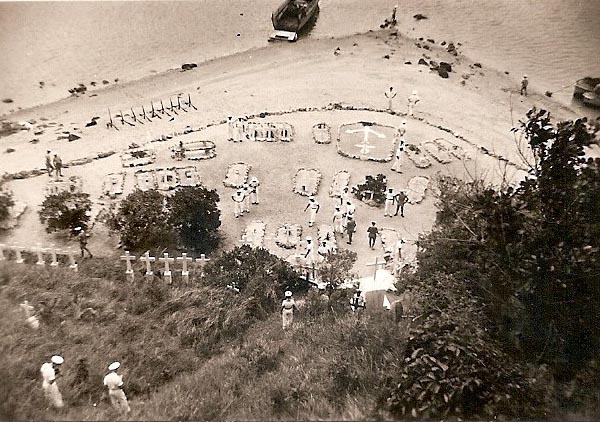
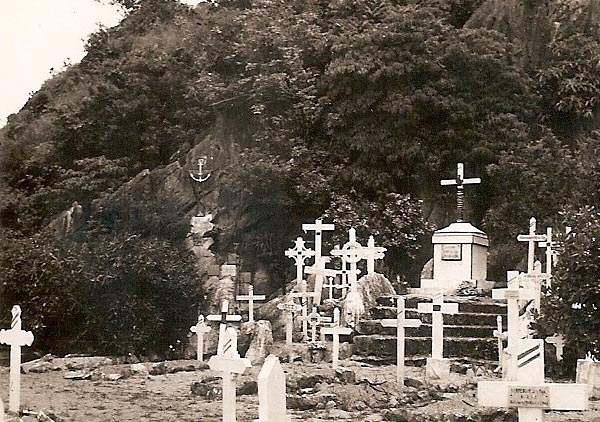
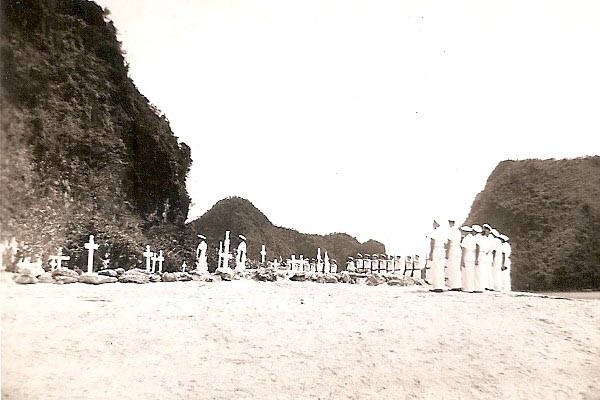
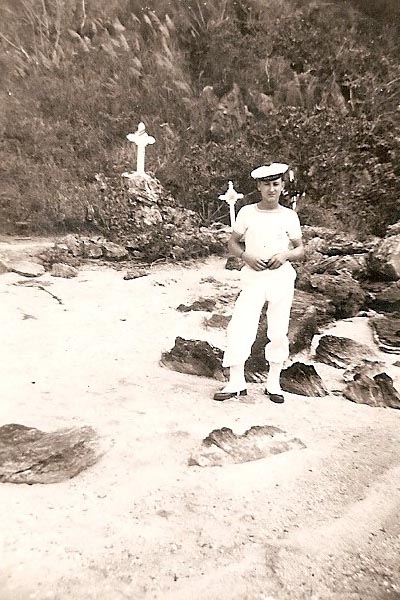
Halong Bay from Apr. 30 to Mar. 3 - Tourane from 4 to Mar. 7 - Culao Cham Mar. 8 - Halong Bay from 9 to Mar. 16 - Tourane on Mar. 17/5 - Saigon Mar. 18
The end of our stay in Indochina
At the end of the war, Canadian blue helmets and Indian blue turbans arrived (when they were bathing, taking off their turban, their hair was down their backs almost to the hollow of their knees) and then more and more Americans in civilian clothes (military advisers). More and more American ships were arriving too, we felt that we would soon be replaced.
It was done on May 30, 1955: we leave the Vietnamese soil, on the dock less crowded than on our arrival, only a few con gai (young Vietnamese women) on foot or in shoots, often in tears, who saw sailors with whom they had had "rapprochements" and hoped certainly to come to France.
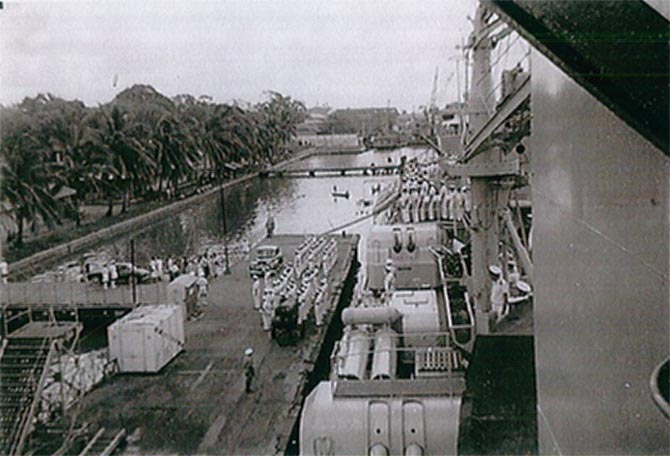
What did we go there?
We were sent there, I wonder why. It was the end. In any case it made us a nice trip. Sometimes we fired 152 at the request of troops on the ground. As per my plate number, the 622q I believe, I was part of the landing company, several times I was sent into the bush on an armored LCM to liaise with Montcalm, , but they got the most often revealed random. When we were under cover, more was happening. When we were at anchor, we had to insure the wharf guards, especially at Nha Trang: to say that the shoreline was calm, the boats on the shore could berth to come and get permission.
While the war was over already for some time, one night the landing company was awake, the time to get ready, we were taken out of Saigon. It was no longer dark because there were fires everywhere, we were left in the plane, the bullets whistled to our ears, we hid as we could, we heard explosions of mortar, we did not lead wide . We did not know what we were doing there. During the day we came back to look for us and on board, we learned what had happened: the Binh Xyuên and the Hoa Hao, armed sects of the army and the police or vice versa, were fighting for to take control of the more or less shady activities of the capital.
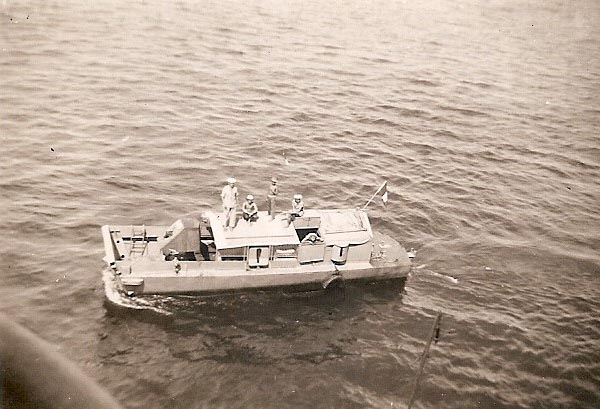
Unexpected meetings
One day when we were in Tourane, friends coming back from leave asked me if I knew a man named René Berringer from Belleville. Of course I knew him! He had enlisted in the air almost at the same time as us, he was then at the radar station of the col-des-nuages. He came on board and we spent the evening together, I have not seen him since.
Another time, after the war, in November 1954, I was in a rest center at Cap Saint-Jacques. While walking on the beach, I heard myself called "Hey Schmitt! ". Looking back, I saw a sort of corpse lying on the sand. " You do not recognize me ? "You are Raymond Plantin, my parents had written to me that you had gone missing in Ðiện Bien Phủ". These are our first words, he then explained to me that he was taken prisoner during the fall of Dien Bien Phu and that he had been part of the famous column of death that had led them to the third interzone in China: two-thirds of the prisoners died en route, from hunger and abuse. Twice he tried to escape, each time he was taken back. When he was released, he weighed only thirty-five pounds. He too came to see us on board in Saigon, I never saw him again. I recently learned that they both died.
To meet two comrades from our village on the other side of the earth, you have to do it.
The return trip
The trip back for us was a real cruise. First stop on June 2nd and 3rd in Singapore that we knew a bit for having already been there twice. With the money we had been given, we take advantage of it to bring back memories. In Indo the piastres were current, but in reality when we left the country they were worth nothing. Before leaving we had to put them on our savings bank booklet so that they would be converted into francs. At each stopover we therefore touched local species, obviously variable depending on the rank. Before each stopover the map of the city was displayed in the corridor crew and there the district Off limit hot area, prohibited, was clearly indicated, which made it the first destination of most sailors. But what interested us most was the huge shopping malls where the vendors were luring us coca-cola, and where we could find a lot of things we were not used to (we were out of the war not so long ago): especially the German cameras Zeiss Ikon who were the best at the time, where the first turntables 33 rpm, which burned when we plugged them on board, because we were equipped with 220 continuous what did not know everyone.
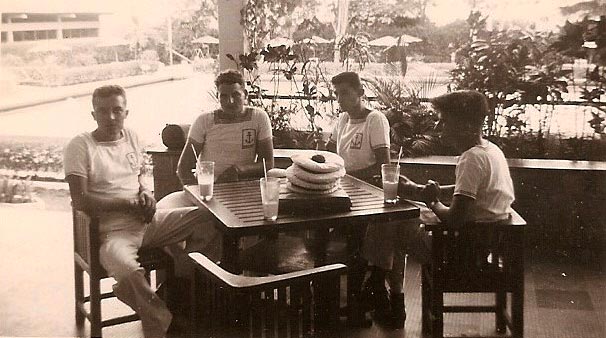
At NAAFI, the soldier's home in Singapore, alcohol was only served at 5 pm There we could eat and even dance at night.
On the 5th we stopped at Poulo Kurum to refuel in oil, then direction Rangoon in Burma, the city with a thousand gold-covered pagodas that we see twinkle in the sun up the Irrawaddy, stops on June 7-8 and 9.
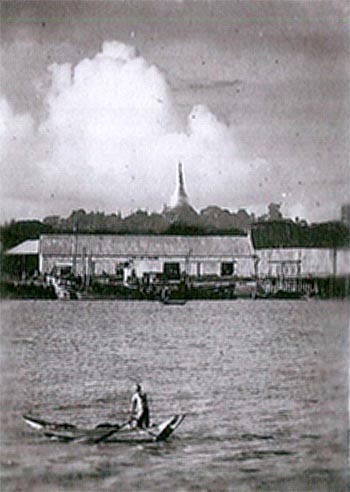
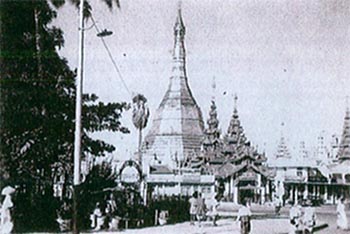
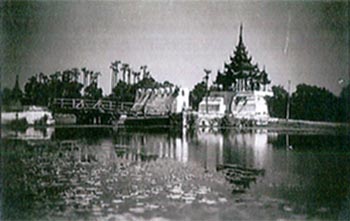
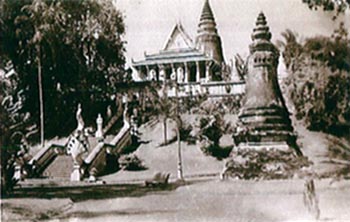
The cruise continues. Now we are heading to Ceylon Island, now Sri Lanka. In the Bay of Bengal we are caught in a typhoon, for several days we were swayed, and even one afternoon, while I was on watch, the boat began to lean, lean, lean, everything was falling in the PC radio then it is reassembled very slowly. He started again on the other side and he came back to the upright, we realized inside that something was wrong. A helmsman coming down from the bridge of command explained to us that we had been struck by what is now called a rogue wave and those who saw it, believed that it was the end: the boat accused 37 degrees of heel, while the theoretical maximum was 35. A lot of damage aboard, in the passage gangway the double bulkhead was split all along and we saw the crack open and close at each twist of shell.
Colombo, June 13, 1955
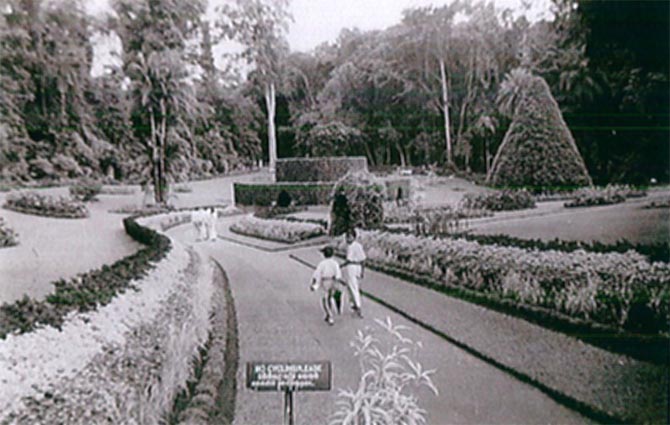
To enter the port of Colombo, it took several hours, because the swell was wrong and we could not enter the pass. Arrived at Colombo, it was no longer the boat but the earth moving. What surprised us in this city was the number of crows, we knew they were garbage workers. An excursion was offered to us in the center of the island in Kandy, still a typical British place. I remember that we ate at the Queen's Hotel, a delicious meal but so spicy that we had to stand at the table to swallow this food. We visited the botanical garden, as well as the acclimation park where many wild animals were waiting for their shipment to other countries. We also visited a tea plantation, in large hangars women in sari of all colors sorted on their knees the leaves one by one, and the pagoda dedicated to the tooth of Buddha where he sits all covered with gold. We were also surprised by the number of elephants that worked. In the evening, their mahouts were bathing them in the river and rubbing them with a brush, they seemed to like that.
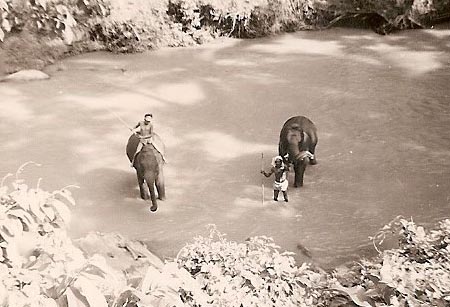
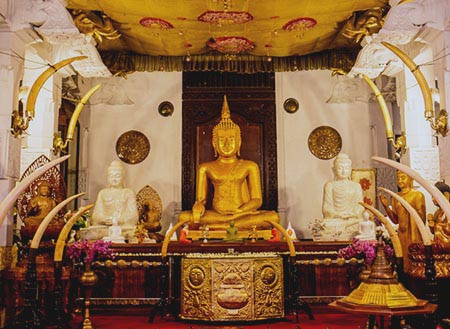
On the 21st we stopped at Djibouti
23 and 24 in Massawa, Eritrea. Not much to say about these cities, except that it is the desert, one of the hottest spots on earth, also the land of thirst. In Djibouti we embarked brackish water, so that coffee in the morning was half salted, same for the ice that was put in the wine. To cool off, we had good tea but made with this water, despite the compensation by a large amount of sugar, it was nothing refreshing. Some went on an excursion to Asmara the capital, and it seems that up there it was very green because it is at altitude.
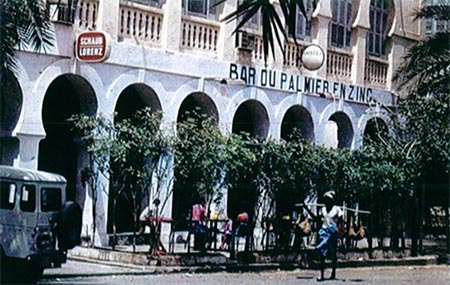
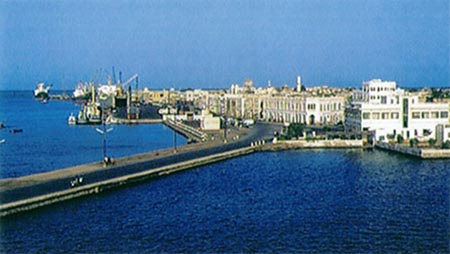
An anecdote anyway: when we arrived in Massawa it was dark, as usual we slept naked on the bridge, in the morning whistles to make us return, we did not see that there were houses on the Haven.
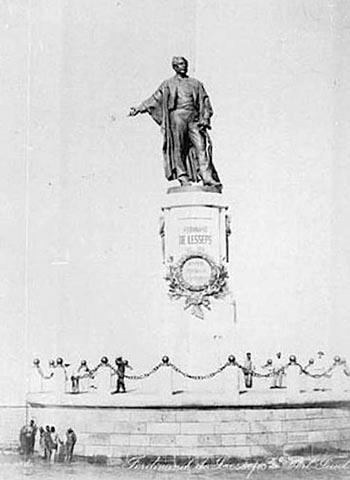
The colossal statue of Ferdinand de Lesseps, more than 10 meters high, erected in November 1899, invited us to enter the canal. Alas this statue will be dynamited a few years later by the Egyptians.
We pass the Suez Canal again to Beirut on the 29th, 30th and 31st of June. Three unforgettable days.
Beirut
This is the first time a ship has stopped in Beirut since in 1943 General de Gaulle had granted independence to Lebanon. We were received with great warmth, whether by Europeans or Arabs. Everyone was trying to speak to us. Radio Beirut came to make an emission on board, passing on the waves the discs requested by the crew. We were received in the gardens of the French Embassy, pretty girls, well stocked buffet and drinks at will. We who for more than a year had known only Asian, we were a little intimidated. Beirut had not usurped its name from Pearl of the Mediterranean, a beautiful city and huge sandy beaches. To say that fights a few years later were going to disfigure this marvel …
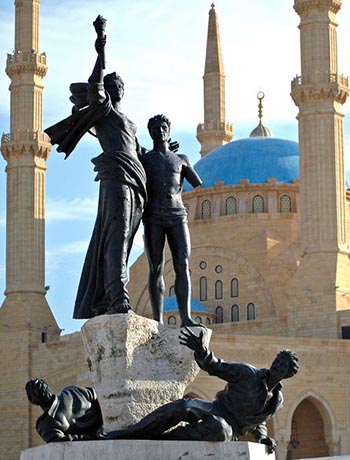
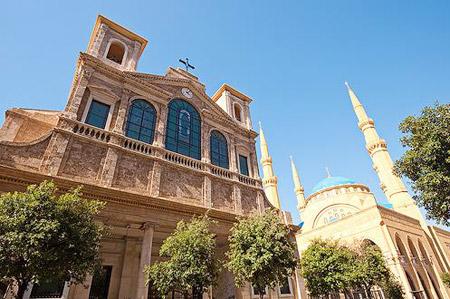
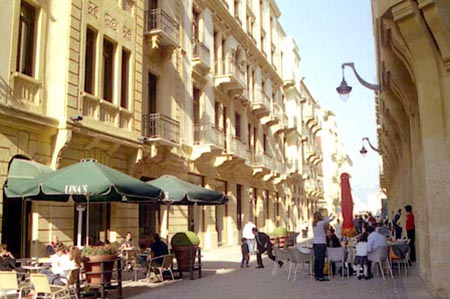
The end of the trip
On July 6 we arrive at Toulon, the Montcalm sports its flame of war, it starts from the top of the mast before and drags far behind in the sea. The flame of war is traditionally raised by a warship which returns from campaign and its length indicates the number of missions carried out to date.
As we were at the end of the contract, Fernand and I stayed on board while the first half of the crew was on leave. We rehabilitated the boat that was going to leave for Sidi Abdallah for a refit and participate in the war fighting in Algeria. Then, in turn, we had ninety days of leave. On returning we were assigned to the fifth depot in Toulon to finish the few days of our time that we had left.
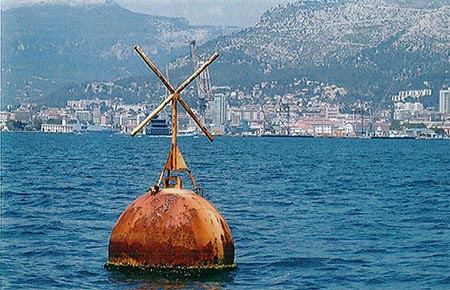
Avenay-Val-d'Or, 2009